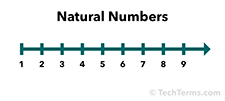Natural Number
A natural number is an integer greater than 0. Natural numbers begin at 1 and increment to infinity: 1, 2, 3, 4, 5, etc.
Natural numbers are also called "counting numbers" because they are used for counting. For example, if you are timing something in seconds, you would use natural numbers (usually starting with 1). When written, natural numbers do not have a decimal point (since they are integers), but large natural numbers may include commas, e.g. 1,000 and 234,567,890. Natural numbers will never include a minus symbol (-) because they cannot be negative.
In computer science, natural numbers are commonly used when incrementing values. For example, in a for loop, the counter often increases by one with each iteration. Once the counter hits the limit (e.g., 10 in for (i=1; i<10; i++)), the loop is broken and the code after the loop is processed.
 Test Your Knowledge
Test Your Knowledge